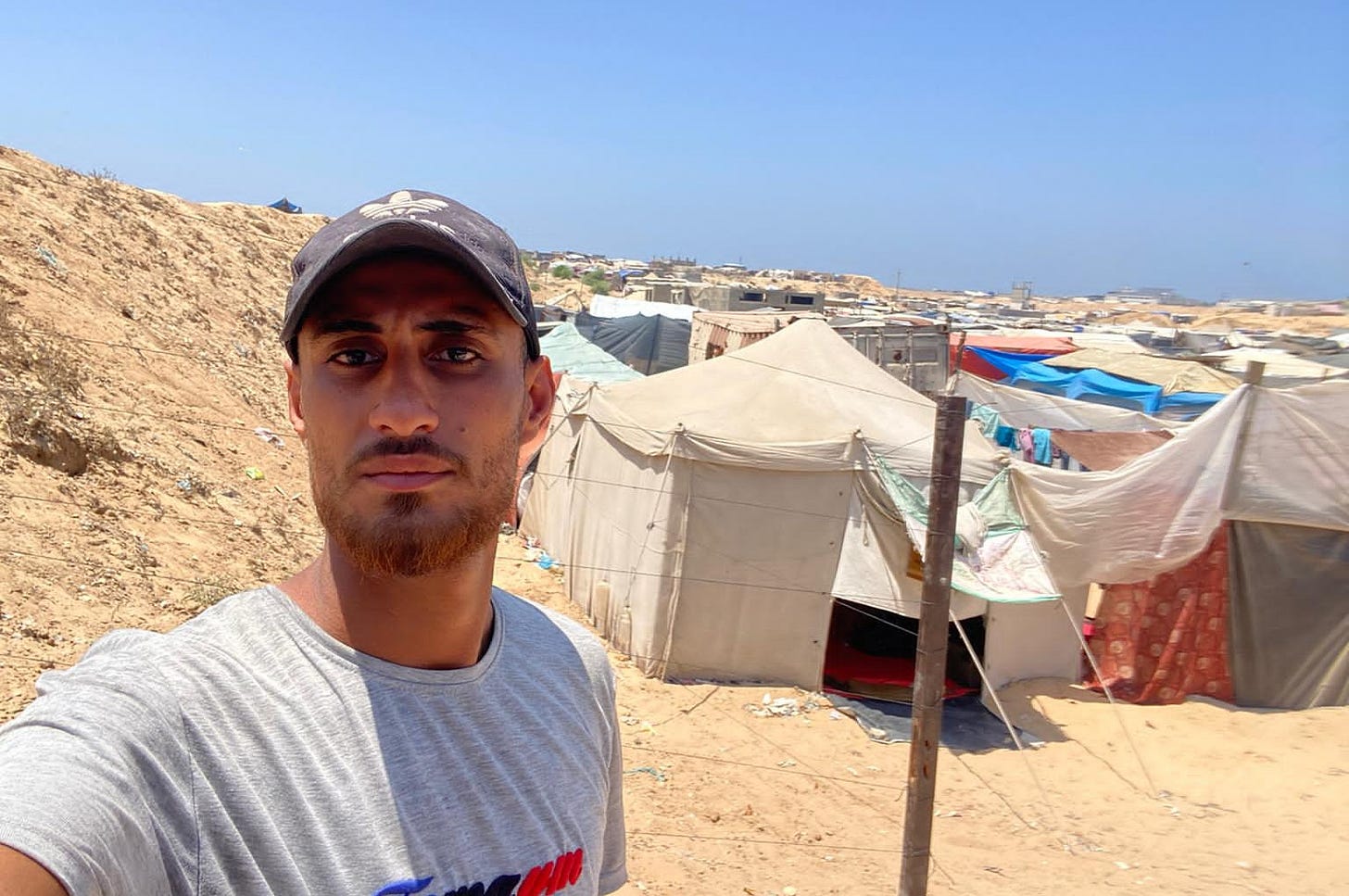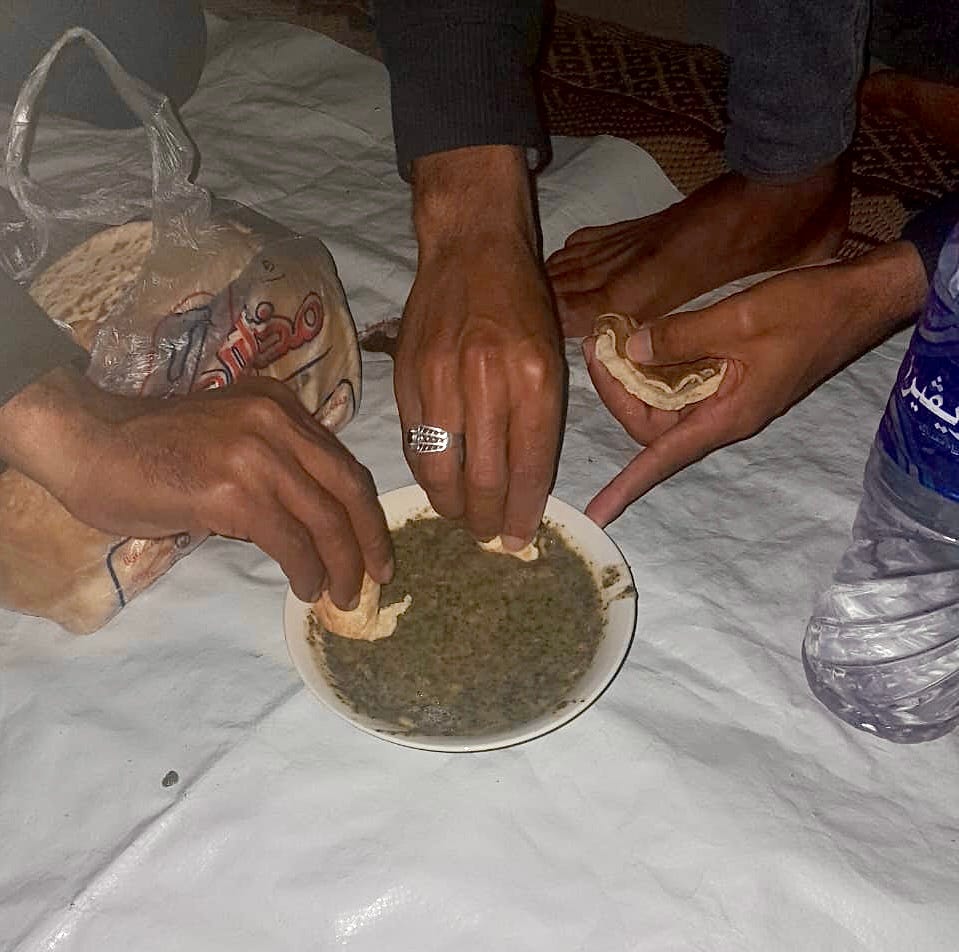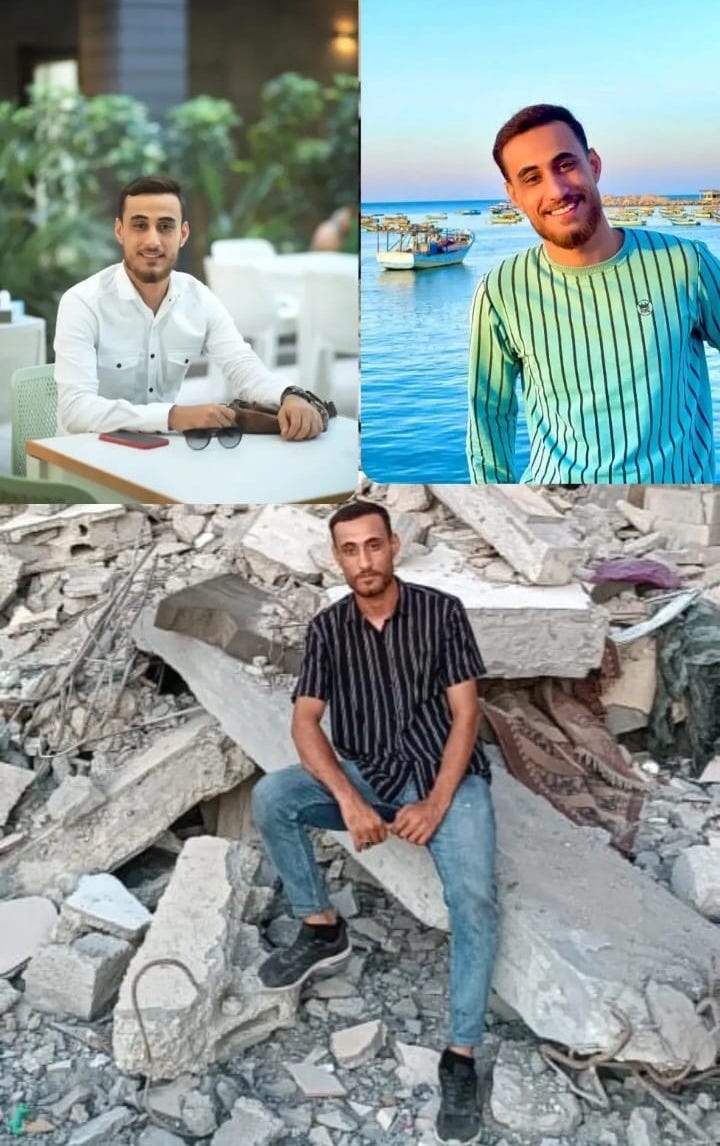Gaza Conversation- Part 7
We are exhausted. We are slowly dying. There is no water, no medicine, no food—the situation is dire. Life is extremely, extremely difficult.
These are a series of conversations that I am having with people in Gaza, which form part of the book I am writing. Part 7 introduces Mohammed Sameer, 23, an e-commerce professional, displaced in Shaga’iya, east of Gaza City, with six family members, including his 7-year-old sister. After the Ceasefire, Mohammed returned to his home from the south, where he was displaced. He currently lives with his family in a tent across from the rubble of what was once his home.
I got in touch with Mohammed through a colleague who is working in Gaza at the moment for another reputable INGO. Mohammed was reluctant at first to talk, but as the days went by and with the start of the holy month of Ramadan, which saw Israel blocking entry of all humanitarian aid into Gaza he began to open up, driven, I’m sure, by the realisation that he must share his story before the looming threat of death claims him and his family.
He disappeared for a couple of days, and then one night, he reappeared again, saying that he had to walk far away from his tent to send me anything, as the internet and 4G were not working where he was displaced.
I asked him what was the one message he wanted people outside of Gaza to get, and over a voice note, he said: ‘We are dying slowly. There may be no bombing, but diseases are spreading. There are no hospitals, garbage is everywhere, and insects are widespread. No water, no medicine, no food—the situation is dire. Life is extremely, extremely difficult. We are dying and have been abandoned - nobody cares!’ His voice carried anger and frustration as I listened, but beneath it all lay the overwhelming weight of 17 months of sheer exhaustion. But he was still determined to survive it all. I asked him to tell me his story. Later that evening, he sent me another voice note.
My story - March 4
My name is Muhammad Sameer. I am 23 years old. I live in a remote area in the east called Shaga’iya. During the war, we were displaced several times, suffered a lot, and lost everything. Before the war, we had been renting a house for 28 years. Thank God, we were finally able to buy our own house and settle down. But as soon as we settled, the war broke out, and we were displaced again. We moved south, but we lost everything we owned.
I used to work in e-commerce, but I lost my laptop, lost my belongings, lost my phone, and had just returned from travel with some savings, which were also lost. Thank God, as people say, "money comes and goes, but life is more important."
As you can see, the situation is worse than it appears. Although the ceasefire was announced in January, the war still affects us on a daily basis. There is no humanitarian aid, water has been completely cut off, and there is no electricity in our area. Every day, we hear gunfire. Just a week ago, my friend’s younger brother was injured while playing with the kids. The bullet hit him in the leg.
The drones are always hovering, and the tanks are nearby. Anyone who gets close is shot at. Gunfire happens at night, in the morning, and all the time. The situation is unbearable. The noise of the war is overwhelming, and we are suffering greatly; we can barely sleep at night because of the zananh (noise drone).
What can I tell you? We are exhausted, completely exhausted, but thank God in every situation. This is me, yes, yes... I will try to keep it short.
The situation is very difficult, and the area we live in has no internet at all. Water is rarely available, and we have to travel long distances every two days just to get some. I also have to travel a long way just to find a connection and access the internet—it’s never easy.
Our lives are full of hardships, challenges, and struggles. Just recently, my friends were also injured due to the tanks. We are living under constant danger, difficulty, and death. But I am here and will remain here until I die.
It is the sixth day of Ramadan as I write this. It has been 5 days since Israel closed all crossings into Gaza and is deliberately blocking all food supplies from entering Gaza. I ask about him and his family and how they are coping. He tells me that the prices of food in the market have skyrocketed almost 300% and that the little food remaining in the market is unaffordable for most people. I ask how he feeds his family and breaks their fast every day? ‘We are surviving on soup and rice. I cannot afford much more,’ he says. ‘I don’t mind, but I worry for my 7-year-old sister, who is insisting on fasting every day. She turned to me yesterday and said that she misses meat and chicken’ - I laugh at her and say, ' Are you crazy? these are things of the past- just eat your soup, that’s all we have now.’
Knowing how hard that must be for him, I ask him how he copes with it all? “We as adults we can deal with the hunger, but these poor young ones, they are still growing!’ He continues to say that to even make soup, they need to buy firewood because the price of one gas canister, which consists of 12 litres of gas, has hiked up to 25$ per liter. Which is impossible to afford for most families. They also need onions ($ 10$ per kilo) and potatoes (12$ per kilo).
‘If we are lucky, we can get some rice on the side, but that also costs a lot; we usually eat our soup with stale bread, that’s all we can find’
On the eighth day of Ramadan, I get in touch to see how they are doing. He tells me they are suffering and that all crossings remain closed. The normal Ramdan meal has now has reached 40$ a meal. He is now looking for funds to feed his family in Ramdan. “I‘ve had a GoFundMe account since the beginning of the war, but donations are scarce. No one donates anymore. No one wants to even hear about us” I ask him about the rate of commission to withdraw cash from the bank when he receives funds, and he tells me this has now reached 30%! So for every $10 donation received, he gets $7. ‘But what can we do if we don’t withdraw money? We will die. What can we do?, We are being slaughtered by both the enemy and our merchants who control the food supply’
He explains to me that merchants appear to be in partnership with Isreal; ‘they are both starving us for their benefit’ - They have the suppliesand they are keeping them in storehouses at the back, and that’s how they control the prices to make maximum profit; ‘they are blinded by profit, because they also have families to feed, meanwhile we die of starvation’. It’s capitalism at its ugliest. It’s also the raw reality of a war economy, one that is highly reliant on external food aid. It’s basic economics of demand and supply - only in Gaza, it’s on steroids.
On the tenth day of Ramadan, Israel cuts off the electricity supply to Gaza, which effectively means no power supply to the remaining, partially functioning water desalination plants. So now, food is blocked, and there is also no clean drinking water. A day later, the United Nations human rights office reiterated that ‘Any denial of the entry of the necessities of life for civilians may amount to collective punishment’. Anger hits me in the face like brick as I read that.
The use of the words ‘may amount to..’ is highly inappropriate in this instance and entirely triggers me. ‘Void complicit words from the UN again. Why can’t our institutions just say it as it is? when has it become so difficult to make a clear statement of truth?’
As I break my fast with my daughter that evening, I find myself reflecting on our meal—a carefully planned, nutrient-rich, protein-packed spread designed to nourish her as she continues fasting through the 30 days of Ramadan. A meal fit for a growing teenage girl. As her mother, I take pride in being able to provide her with meals during Ramadan and facilitate her choice to fast.
Later that night, as I drift into sleep, I can't stop thinking about Mohammed’s young sister, longing for meat and protein to nourish her growing bones. I think of him and the families I’ve come to know over the past year—families who search in vain for scraps of food, who are being deliberately starved while the world watches this slow, unfolding genocide.
Ramadan is meant to be a time of togetherness, of gathering with loved ones. It’s a month where hunger is endured as an act of faith, a test of patience and discipline. Every Muslim who fasts knows the relief that comes when the sun sets—when we finally quench our thirst and nourish our weary bodies. And yet, I cannot begin to fathom what it must feel like to sit at the table with nothing—no food, no water, nothing to break the fast but the ache of an empty stomach.
The following week at work, I find myself in debates with colleagues about what this all means. Surely, this is a grave violation—a complete breach of the so-called "ceasefire agreement"? But apparently, it’s not. A breach, I’m told, only occurs if the military assault on Gaza is officially relaunched.
I sit with the absurdity of it all—this madness unfolding before us—while two million people stare death in the face, slow and inevitable.
Then, just as we’re all logging off on Friday evening, after another gruelling week at work, I get news from Gaza that says after blocking food and cutting off water, the Israeli cabinet is now considering approving a "limited" military offensive in Gaza—yet another means to pressure Hamas to release the hostages.
If this is true, then God help us all.
Over the weekend, Mohammed sends me more pictures—snapshots of himself before and after the war. Perhaps it’s his way of holding onto memories of better days, a way to cope with his worsening reality.
Maybe, deep down, his soul is reaching out, longing to be seen, remembered—for having endured this long. "I am hungry, I am thirsty, and I am so very exhausted. I feel like I’m starting to lose hope… and I don’t know how much longer I can hold on."
Perhaps he wanted me to share these photos so he could affirm his humanity, to document his short-lived, fleeting story before it’s too late. Perhaps he wanted me to share these with the world as a final act of defiance to be remembered - not as a number but as a human being who has fought to survive the genocide with every bone in his body, yet feels deep down that his journey is nearing its own end.





I think this should titled: Chicken? Are you crazy?
Thank you for sharing this story.